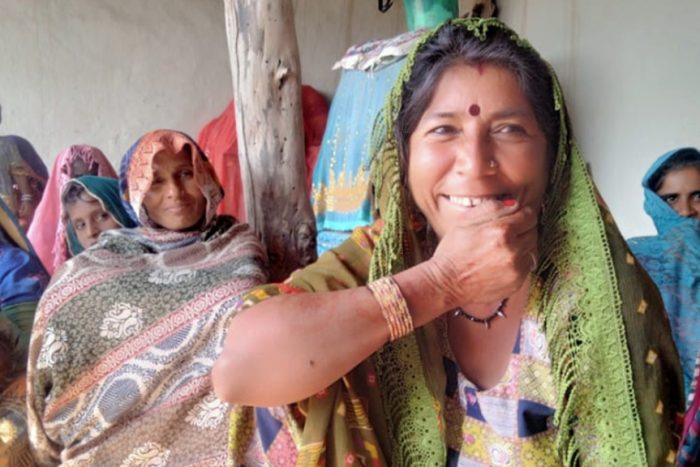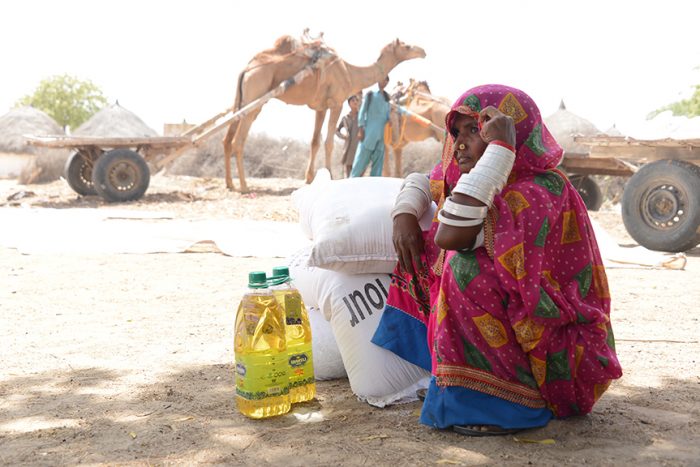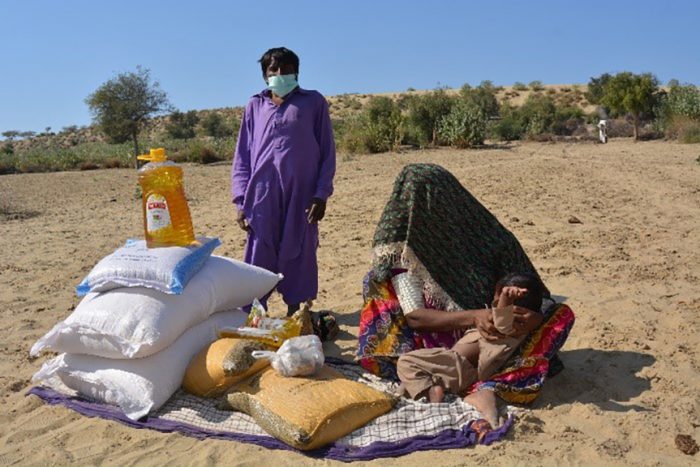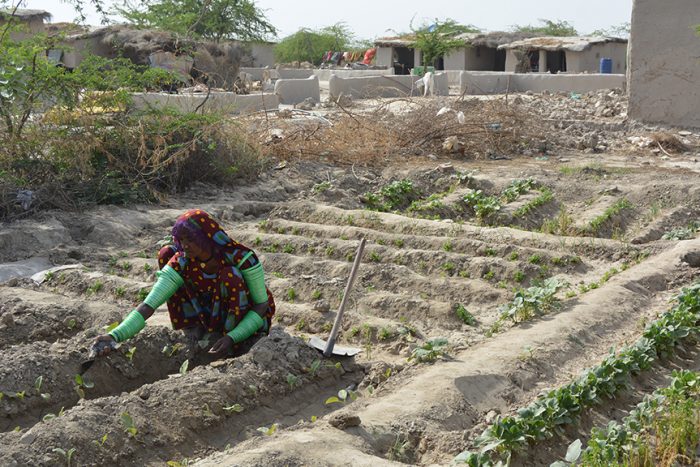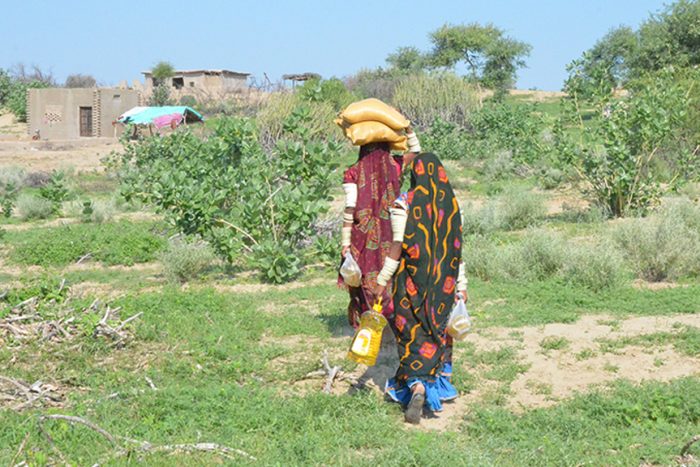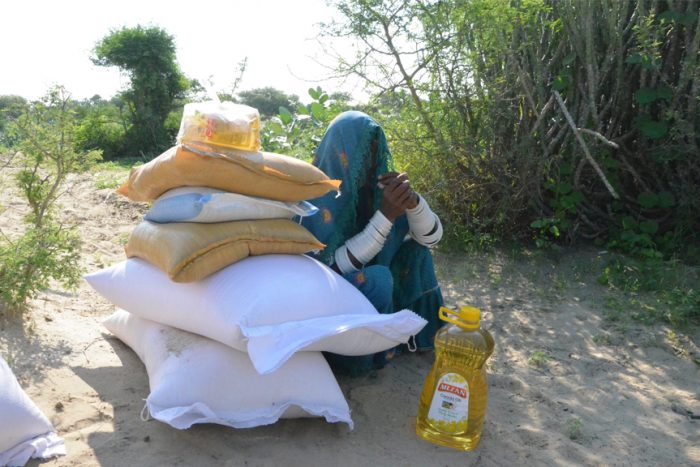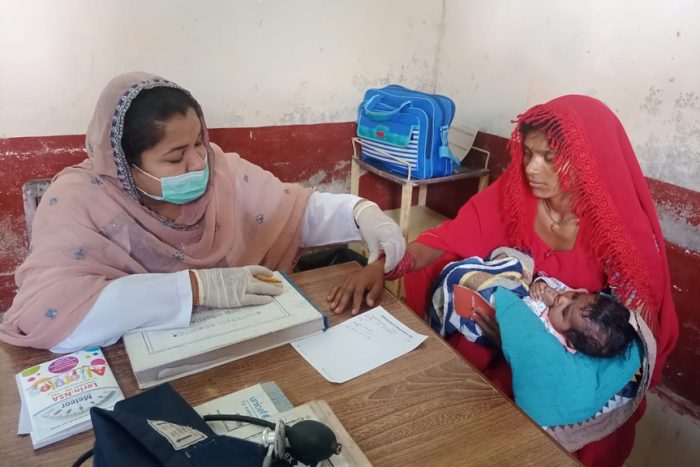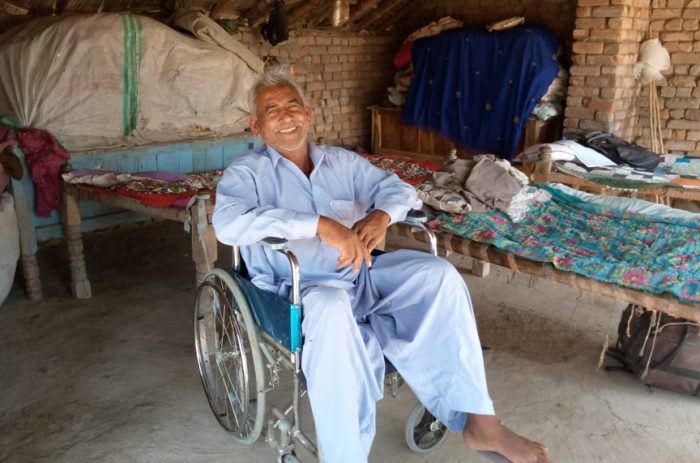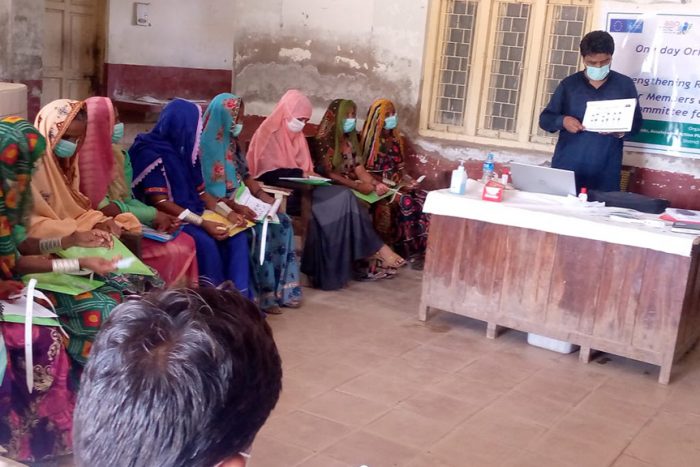Archives
Providing sustainable humanitarian support to farming families affected by climate change and Covid-19








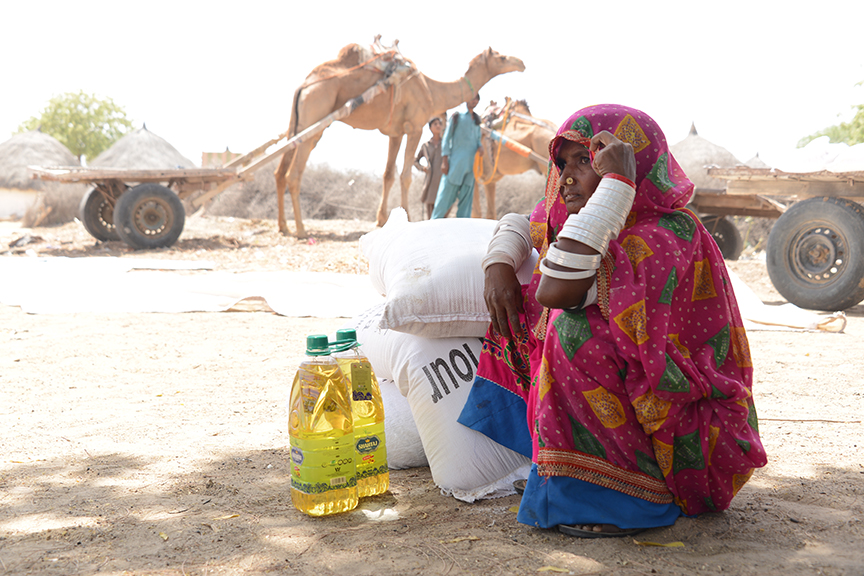





Community World Service Asia has partnered with Presbyterian World Service and Development (PWS&D) and Canadian Foodgrains Bank to implement a Humanitarian, Early Recovery and Development (HERD) program to support drought and climate change impact communities with food provision and sustainable agricultural inputs. The project aims to assist most vulnerable, rural agrarian communities in Pakistan’s rain-fed Umerkot District of Sindh. The target communities will receive immediate humanitarian support, followed by recovery and development assistance, to ensure their resilience is enhanced against future natural and man-made catastrophes.
A total of 1,125 drought and COVID-19 affected families have been provided with two monthly food packages under the project. They will continue to receive the food packages till August (to complete a period of six months). Each package has been designed in line with the Sphere minimum standards and ensures all family members receive 2100k calories each per day. The items include 60kg of wheat flour, 15kg rice, 7kg pulses, 6liters cooking oil, 4 kg sugar, 400gms tea leaves, 800gms iodized salt and of match boxes. Feedback mechanisms that are put in place to ensure quality and accountability mainstreaming have been explained to communities at various stages of the project. Communities have also been oriented on safeguarding and complaints response guidelines.
Through the provision of food packages, we aim to ensure food security of affected communities in various parts villages of Umerkot to increase their nutritional status and improve their general health. Most of these communities live in extreme poverty, with their primary livelihood of agriculture being affected by extreme weather conditions that prevent them from spending on the most basic food and health needs.
A Rapid Gender Analysis was conducted as part of the project to gather critical information and data on the local gender dynamics and the many challenges and needs that exist and potential goals and opportunities to explore and meet through the project. The analysis is a necessary first step in creating gender-sensitive, suitable, and successful programming. It is supporting in the development of practical programming recommendations to suit the needs of women, men, boys, and girls, as well as ensuring that execution does not unwittingly harm them. Additionally, an environment assessment has also been conducted to identify environmental impacts of different project activities and their possible mitigating measures.
The HERD project is a two years’ program started from January 1, 2022 with ten months of humanitarian phase and 14 months of recovery and development phase. The project will end in 2023.
Enhancing food security of drought-affected families in Umerkot
Jetho, 41, resides in Rani village of Umerkot and is the only breadwinner for a family of six members, including his mother, grandmother, wife and two children. In 1990, when he was only 10 years old, Jetho was diagnosed with a bone disease. “I was not able to afford the treatment for the disease I contracted. From the government hospitals, the treatment cost was around PKR 5000 per month. My wife and mother applied some home remedies but that could not completely cure me. This condition stunted my growth and left me with a marginal disability. It is challenging to cope with the daily tasks but I have to push myself to do more as my family is dependent on me.” Agriculture is Rani village’s main source of income. In July and August, during the monsoon season, Jetho grows a variety of crops on his two-acre plot of land, including cluster beans, millet, mung, and sesame. Crop production is strongly reliant on the amount of rain that falls in the area. A good harvest allows Jetho to earn an estimate of PKR 7000 per month as he sells the surplus in the markets of Kunri and Umerkot City. Unfortunately, Rani village has not received enough rain in the last five years. As a result, Jetho started supplementing his income with managing cattle for other villagers. He earnt PKR 2500 each month through this.
Belonging to a family of generational farmers who have been growing seasonal, monsoon reliant crops, Jetho, like several others has struggled to get any harvest or produce for years since the drought started hitting their village. Farmers of Rani village have thus abandoned their lands and have switched to other labour work that allows them to earn some money. The COVID-19 pandemic further decreased work opportunities for many local communities in the area as many small and large businesses suffered losses due to lack of sales and lockdowns. Jetho is struggling to make ends meet due to lower wages. “I could not afford to buy any more seed to plough the ground. I do not see any harvest this season. The lack of rain and low agricultural production has dropped my earning by 45%. To make ends meet, I have to borrow money from my relatives or purchase food items on credit from local shops.”
Community World Service Asia’s and UMCOR’sⁱ emergency project provided humanitarian and recovery assistance to vulnerable households that are frequently impacted by natural catastrophes and climate change impacts in Umerkot. The project ensured access to emergency food and agricultural seeds for disaster-affected people so that they could resume their livelihood activities. Jetho was one of the 608 families who received food packages and eight kg of millet seeds to help commence agrarian farming. The food package contained 80 kilograms of wheat flour, 15 kilograms of rice, 8 kilograms of pulses, 7 litres of oil, 4 kilograms of sugar, 400 grams of tea leaves, and 800 grams of iodized salt, and a matchbox.
With this support, Jetho’s family is now able to eat three meals a day, with adequate portions for every family member. Farmers in arid parts of Umerkot have adapted to climate change by switching from ploughing water-intensive rice, sugarcane and maize cultivation to drought-resistant millets. Farmers in this area are encouraged to shift to growing millet, to reduce the impacts of climatic changes on their food security and standard of living.
ⁱ The United Methodist Committee on Relief
Mahavi observes increased food security through kitchen gardening in Umerkot
“If women farmers had equal access to resources, they could produce enough food to keep 100 to 150 million people from going hungry.” Food and Agriculture Organisation (FAO), 2011.
Women’s access to resources and effective technologies is often constrained by gender barriers. There is limited access to development resources and services that have led to large-scale illiteracy, poor health, gender-based violence and inequality among women and girls in most parts of the developing and under-developed world.
Community World Service Asia (CWSA), with the support of UMCOR, is promoting kitchen gardening as an integral part of the farming system among women in Umerkot. Daily household produce like fresh vegetables and fruits are regularly provided to local families through these home-based gardens. Since Umerkot is a predominantly patriarchal society, women are solely engaged in domestic chores such as cooking and ensuring that the family is well-fed, making them key participants of kitchen gardening activities planned under the project. To meet its goal of building resilient communities and empowering local communities and women, CWSA initiated a six-month humanitarian and early recovery projectⁱ for frequent disaster and climate change affected communities in Umerkotⁱⁱ.
Mahavi, was selected as a project participant in September 2021. The fifty-two-year-old mother of four children belongs to a remote village named Umed Ali Chandio, located in Umerkot district. Mahavi’s husband has been struggling to earn a living as farming activities have largely reduced due to the droughts in the district. “Fifteen women, including myself, were part of a training session on kitchen gardening conducted by CWSA’s emergencies team. The session enhanced our knowledge on saving and utilizing available resources without compromising on environment. It familiarised us with better farming techniques, off-season vegetables and kitchen gardening production and setting up of vegetable gardens among various households in remote villages.”
To increase diversification in daily meals and to help her set up a productive kitchen garden, Mahavi was also provided with seeds of spinach, cluster beans, ridge gourd, bottle gourd, coriander, Indian squash, garlic, wild melon and eggplant. She now has access to green and fresh vegetables which her family consumes on a daily basis. Additionally, the five-member family was provided with a one-month food package to meet their dietary needs. Many women, like Mahavi, are playing a significant role in building a sustainable food security through these kitchen gardens. They are overcoming challenges of food insecurity and malnutrition by growing fresh vegetables and fruits in their luscious gardens. “I am ensuring that my children take a healthy diet by consuming the vegetables grown from my own garden. My family looks forward to every meal of the day as I am now making diverse dishes,” said Mahavi, a satisfied project participant.
“We are happy we get to eat fresh vegetables. We feed ourselves, and, we also feed our neighbours through the extra produce the garden gives us. Many women in my village have started to make their own kitchen gardens after seeing how I am making different dishes without making an effort to travel to the market place to buy vegetables which are more costly.”
“Climate change is threatening our planet, food security and livelihoods. We are so lucky to have these kitchen gardens as they support us to maintain healthy diets and livelihoods by growing organic vegetables and fruits. Families have come to embrace food security, increased nutrition and increased diet awareness which supports them together in a community of wellness and good feeling,” reiterated Mahavi.
ⁱ Humanitarian and recovery support to the vulnerable communities continuously affected by recurrent disasters in Umerkot, Sindh, Pakistan
ⁱⁱ In 2021
Promoting Sustainable Quality Education
Community World Service Asia is supporting local and provincial education programs in promoting sustainable quality education for both boys and girls in various parts of the region. One of its programs focuses on ensuring quality education in Umerkot and is implemented in collaboration with government bodies, school management committees, teachers, the local communities and other relevant stakeholders. Despite the various obstacles experienced in the operational environment owing to COVID-19, CWSA continued to provide educational opportunities for underserved communities in Umerkot. By increasing the quality of education and eliminating the literacy gap between boy and girl students and empowering women and girls, CWSA strives to provide inclusive and equitable quality education and gender equality.
A ray of hope and a chance of a better future for Seeta and her daughters
“This humanitarian assistance will enable me to meet my family’s food needs for more than a month. The millet seeds will assist me in reviving my agricultural livelihood, which I want to pursue with the help of my nephew and son-in-law in make a better living. This will enable me to send my girls to school so that they may receive an education and have a brighter future. This help came at the perfect time, just when we were struggling to afford a single meal a day even,” Seeta explained.
The Village Management Committeeⁱ of Sheedi Jo Tarr village identified Seeta as a project participant under Community World Service Asia and UMCOR’s relief projectⁱⁱ. The project is supporting climate induced disaster affected families with the provision of food packages and seasonal seeds for harvesting in the upcoming farming season.
Seeta, a widow belonging to and living in Sheedi Jo Tarr village of Umerkot district, does not have any children of her own but has in fact adopted four daughters of her nephew and has raised them as her own. “I got married at a very young age. I was only 16 years old. While my husband was alive, we decided to adopt two of my nephew’s daughters. We have nurtured them as our own, and we adore them. We married our eldest daughter off at the age of 20 in 2009. It was a very joyous moment for us,” shared Seeta.
Seeta’s husband, Geneso, died of a heart attack in 2010. Following Geneso’s death, Seeta’s nephew’s other two daughters became close to her, as her nephew left them with her when he and his wife went to work in the fields. Seeta would care for the three children by herself all day, and the two younger daughters grew to love her and refused to live with their parents. As a result, Seeta has been caring for the three children on her own since then. Her nephew had a meagre income and would give Seeta a portion of it to help her care for his children. However, this was insufficient to meet all of the children’s necessities. “My husband worked in the farming industry. He had rented acreage and cultivated a variety of crops on it. I occasionally assisted him in his agricultural endeavours. However, after he passed away, it became impossible to make a decent living, as I was caring for my three girls alone. The money did not come in as frequently as it used to. I could not work in the fields on a regular basis because I had to care for my house and girls. However, I used to be able to pick cotton and chilli occasionally to earn a little money.
Our neighbours and relatives sometimes offered cash assistance, but it was insufficient to meet our family’s basic needs. At 69 years now, working to earn a living for my family has become too exhausting for me. My daughters help me at home, but I want them to go to school so they may have a better future. My ten-year-old daughter has completed her basic schooling. The two younger ones, who are five and three years old, on the other hand, have not been enrolled in school yet. Unfortunately, I am unable to cover the costs of their schooling,” Seeta explains.
Seeta received the food package on October 8th, along with 516 other families at a distribution activity held in her village. The food package consisted of wheat flour, rice, cooking oil, pulse, sugar, tealeaves, iodized salt, matchbox and millet. “Since receiving the food package, we have been eating wholesome meals on a daily basis. My nephew and son-in-law have offered their assistance in preparing the field for millet seed sowing. We now have hope of making money from our agricultural efforts, and I intend to enrol my girls in school,” Seeta concluded.
ⁱ A community-based structure consisting of key community members, both men and women, who coordinate with and support the project team during project interventions.
ⁱⁱ Humanitarian and recovery support to the vulnerable communities continuously affected by recurrent disasters
Providing food security and livelihood sustainability to most vulnerable, climate change affected families in Umerkot, Pakistan
Bai lives in Umerkot’s Rajari village with her spouse Ramji. Bai was born with a physical disability and is unable to walk on her own. Ramji is unable to see, and has been declared blind by doctors since he was five years old owing to an eye infection. Bai and Ramji were married to each other by their parents when Bai was 26 and Ramji was 29 years old and now are parents to two children; a son named Veeram and a daughter, Samina.
The couple earned a living through beggary in the neighbourhood and lived in a one-room house offered to them by fellow villagers in Rajari. They would go house to house or wandered in the streets until someone gave them some charity money.
“We have always wanted our children to go to school and make a better life for themselves. Unfortunately, we are unable to give them that right as we barely make ends meet by the money we receive. Our income is not steady as it depends on the charity of others. Our children also beg with us occasionally,” added Bai sadly.
Four years ago, when Veeram turned 16 years, he started working as a farmer at the local agricultural fields. He was would earn an income of PKR 7000 each month (Approx. USD 40). “Veeram is a dedicated and hardworking individual. He despised begging and felt awful whenever he saw his younger sister, Samina, begging on the streets. He was anxious to find work and support his family and stop them from begging,” Bai explained, “We stopped begging as Veeram began to provide a source of money for the family. We were living a very simple and happy life since we didn’t have to rely on begging or on someone else’s generosity for a living.”
Veeram planted cluster beans, mung beans, wild melon, millet, and sesame among other crops. He farmed the crops on a two-acre plot of land he rented from his landlord. The landlord received fifty percent of the produce as rent.
The majority of the union council that Rajari is located, is a rain-fed area, and agriculture is solely reliant on rain showers during the monsoon season, which occurs between July and August every year. Unfortunately, Rajari along with other villages did not receive enough rain this year, and subsequently the agricultural production did not meet expectations. “Veeram was unable to find work in agriculture since it became nearly impossible to harvest without rain water. We had to borrow money from the landowner to make ends meet. Veeram took a loan of PKR 10,000(Approx. USD 57) to buy groceries and cover other household costs.”
Many families in Rajari and surrounding villages were affected by the drought and the locust invasion and were left with no source of livelihood, driving them to poverty and famine. To support these affected communities, Community World Service Asia and its partnersⁱ, provided food packages and millet seeds to 516 households in the area. Each food package contained wheat flour, rice, cooking oil, pulses, sugar, tealeaves, iodized salt, matchbox, and millet. These packages have been developed to alleviate food insecurity among climate change affected communities while also enabling them to self-sustain themselves through agricultural activities.
Bai’s family was identified and selected as a project participant to receive the food package by the Village Management Committeeⁱⁱ. Bai received the food package on October 8th during the distribution activity conducted in Punhoon Bheel village, which is a kilometre away from Bai’s home.
“I was overwhelmed when I heard that our family will be receiving assistance. The food package includes nutritious food items that will last us for a good two months, as we are only four members in the family. At the distribution day, it began to rain. We are more optimistic that we will be able to cultivate the millet seed included in the package, and that my son will be able to find labour in the fields. This support has given us hope when we had no hope left and nowhere to go,” shared Bai.
Improving Access to Maternal Healthcare for remote and underprivileged communities in rural Sindh
Twenty-three year old Diya lives in Ramchand Khatri village of Umerkot which is located at a five kilometres distance from Community World Service Asia’s Maternal, Neonatal and Child Health (MNCH) centre in the same district. Diya first visited the MNCH centre with complains of nausea, vomiting, and weakness in October last year.
After thoroughly examining Diya, the lady health visitor at the centre advised her to take a pregnancy test, which came out to be positive. Diya was expecting her first child. “My haemoglobin was low at 9.0 when I first visited the MNCH. The medical officer advised for antenatal care (ANC) and prescribed multivitamins to me to address the weakness and normalise my haemoglobin levels. My ANC card was created, and I was scheduled for a follow-up appointment in one week.”
The following week Diya went for her follow-up examination at the MNCH where the doctor further prescribed Monofer Injections for her increasing weakness and low haemoglobin levels. “My mother-in-law was concerned about my well-being. But her anxiety was reduced when she accompanied me to the MNCH to observe how effectively the medical personnel attended to my needs and treated me.”
Ramchand Khatri is a remote village in Umerkot, with limited livelihoods opportunities and no immediate access to education, electricity, safe drinking water, health facilities or fully constructed roads. “My husband works as a farmer. During the harvest season, my husband receives his share of the crop after cultivation,” shared Diya. “Other days, we survive on the loan we take from the landowner my husband works for. Sometimes when he is able to find other labour work, he is able to earn a small income. Our total monthly income barely adds up to PKR 8000 (Approx. USD 51). Therefore, we have not been able to set aside any funds for healthcare.”
Diya has been going to the health centre for her antenatal care on a regular basis. She is in her last month of pregnancy now. “We are unable to afford good healthcare services offered at the city hospital so this is a blessing for us,” Diya’s husband said, expressing his satisfaction with her treatment at the MNCH. “We were concerned about how we would be able to afford and provide good healthcare to Diya as we found out about our pregnancy. Our concerns, however, dissolved soon after we visited the MNCH. Diya’s haemoglobin level improved and normalised as a result of her regular antenatal care appointments. The medical team at the centre have treated Diya proactively and the baby and her appear to be in good health.”
Giving a sense of hope for differently-abled people in rural villages of Sindh, Pakistan
Lalo is from a small village in Umerkot’s Pithoro tehsil[1] called Achhlo Kolhi which mainly homes a Kolhi[2] community settlement, consisting primarily of farmers from a religious minority population in Sindh. The village is located at a 10 kilometres distance from Community World Service Asia’s Maternal, Neonatal and Child Health (MNCH) center in Pithoro, which was set up under its health project[3] in collaboration with Act for Peace. The Kolhi community have limited livelihood prospects due to their heavy reliance on agriculture and many of them are living below the poverty line. Currently, eighty of the Kolhi households in the village even lack basic amenities such as safe drinking water, education, and health care.
Lalo supported his wife and seven children working as an agrarian farmer for long hours on agricultural fields in the area. His elder sons also worked on the fields with him and the family survived and sustained on the income from the farming on a day to day basis. Something tragic that happened last year (2020) deprived Lalo of this livelihood, changing his life forever and left the family in a crumbling state.
“Working in the agricultural fields provided me with a monthly income of PKR 10,000 (Approx. USD 63). In April of 2020, I paid a visit to a relative of mine, Geno, who lived in a nearby village, Bacha Band, during monsoon season and it was raining heavily. We were in a room when the roof fell over us, burying us beneath the rubble. Both of us were seriously injured and were transported to the hospital straight away. Geno succumbed to his injuries after a month in the hospital. While I was left with a crushed femur (thighbone) and have been unable to walk since.”
Lalo was well known for his social skills and actively socialised within the community. He was a hardworking father and husband who worked for hours in the agricultural fields, collected fodder for the animals daily, visited the nearest town to buy household groceries and happily took part in all religious rituals and family events. However, the accident changed this lifestyle of Lalo. It became very difficult for him to manage anything on his own. Most of his days were spent lying down in bed, as he struggled to move about with only his hands. Lalo could not work on the fields anymore, an activity he had grown accustomed to and was a sole source of income for his family and him.
With the help of the wheelchair, Lalo has been more mobile and is able to attend to some household chores as well as socialise as he used to. “At times when I felt more pain, I have not been able to visit the MNCH. However, now I am able to visit the health centre when needed. I am also participating in our religious rituals again. This initiative has given me hope to come back to the normal life I had and step towards a good and healthy life.”
[1] In Pakistan, a tehsil (or taluka) is an administrative sub-division of a District. Those are sub-divided into union councils.
[2] Kolhi is a subgroup of Koli community native to Sindh, Pakistan. Kolhi’s mostly are Hindu but some of them are Christian and Muslim.
[3] Umerkot Health Project, implemented by Community World Service Asia and funded by Act for Peace
Enabling remote communities to timely detect and address Malnutrition among Children in Sindh
The Community-based Management of Acute Malnutrition (CMAM) Surge Approach is designed to enable health systems to effectively treat children diagnosed with acute malnutrition. The CMAM approach relies on the assumption that the number of children with acute malnutrition increases drastically at certain times of the year in many places. Low birth weight owing to poor maternal nutrition, protein-energy malnutrition, anaemia, and iodine deficiency are all major nutritional issues in Pakistan. Since 2013, Pakistan has been a part of the worldwide Scaling Up Nutrition (SUN) effort to address these nutritional issues. Sindh is severely affected by intensifying malnutrition and stunting indicators. As many as 48 percent children under the age of five are stunted while 35pc of them are severely stunted[1].
Aware of the rising rates of acute malnutrition among remote and impoverished communities of rural Sindh, the People’s Primary Healthcare Initiative (PPHI)[2] of Sindh, in collaboration with Community World Service Asia, conducted orientation sessions on CMAM Surge Approach for community-level implementation for early diagnosis and referral of malnourished children in Umerkot district of Sindh.
In June, awareness and orientation sessions on CMAM Surge approach were held in two villages of Umerkot where forty members (both men and women) of village level Health Management Committees (HMC) participated
The sessions focused on the CMAM Surge Model that seeks to improve the resilience of health systems to be able to deliver more efficient and effective medical and preventive treatment for acute malnutrition over time. The focus was on providing the best care during times when cases are at a peak and the need for health services to address these cases is the highest. The potential to save maximum lives is at its greatest then, while ensuring that the capacity and accountability of the public health sector is not undermined.
The CMAM Surge applies an eight step approach to assist health teams in responding to rapid changes in capacity and caseloads. The scaling up of CMAM Surge has resulted in additional learning and adjustments to the methodology that are context-specific. The sessions were facilitated by PPHI and along with thorough learning on the CMAM, nutritional plans, relevant reading material, referral slips and brochures were shared with participants.
In the last six months, 45 cases of malnutrition have been recorded at the MNCHs of Samaro and Pithoro as a result of insufficient food and an absence of a balanced diet. Participants learned about the prevalence of malnutrition and its causes, particularly among children. During the sessions, participants were made aware of the many different forms of malnutrition and how to prevent it. The importance of breastfeeding and consuming a well-balanced diet were stressed upon with participants. A practical exercise was also conducted where participants learned how to measure lactating and pregnant women and children using the Mid-upper Arm Circumference (MUAC) tape.
Learnings of HMC Members:
“I knew very little about malnutrition and the services provided by PPHI to alleviate malnutrition in Sindh. We learned a lot about identifying cases of malnutrition and when and how to refer them to doctors. I will now be able to check children for malnutrition and, if necessary, refer them to the nearest PPHI centre. I also learned that malnutrition is not a disease, but rather a result of human negligence, poverty, unsanitary conditions, and food insecurity. I will sensitise people in my community to maintain hygiene at home and their neighbourhood and provide a healthy diet to their children to avoid malnutrition.”
Chetan Kumar, member of Health Management Committee in Samaro
“The CMAM Surge Model approach is a great way to assist health systems offer treatments to children with acute malnutrition more effectively. Members of the HMC will be able to predict when seasonal caseload surges are likely to occur and will use this information to better prepare themselves for management of services during times of high demand. We were able to gain a thorough understanding of malnutrition, its causes, and how to prevent it. We are now better equipped to refer malnourished children to the nearest PPHI centre for treatment.”
Nabi Bux Solangi, member of Health Management Committee in Samaro
“We discovered that the MUAC is utilised to determine nutritional status of women and children. Because it is simple and inexpensive to use, we can efficiently apply it for active case finding. MUAC is an effective indicator of mortality risk associated with malnutrition, it is therefore a better measure to identify children most in need of treatment. The use of MUAC tape will allow me to immediately refer children with acute malnutrition to doctors in a timely manner.”
Lachmi, member of Health Management Committee in Samaro
“It was my first nutrition training session, and it was a great learning experience. Malnutrition awareness is critical in our community, and individuals must understand how to prevent it. The knowledge on malnutrition, its prevention, and the usage of MUAC tape will help in the mitigation of malnutrition in our village, Mirashah.”
Shanti, member of Health Management Committee in Pithoro
“We were not aware of PPHI’s nutrition program being operated in our vicinity. This session improved our knowledge of malnutrition and its many forms, as well as the use of MUAC tape and the referral of suspicious cases to the PPHI health centre for treatment.”
Sisliya, member of Health Management Committee in Pithoro
[1] https://www.dawn.com/news/1426604
[2] Footnote: PPHI Sindh is a not-for-profit company setup under section 42 of The Companies Act 2017. PPHI Sindh has focused on mother and child health and has continuously improved delivery coverage all over Sindh.





